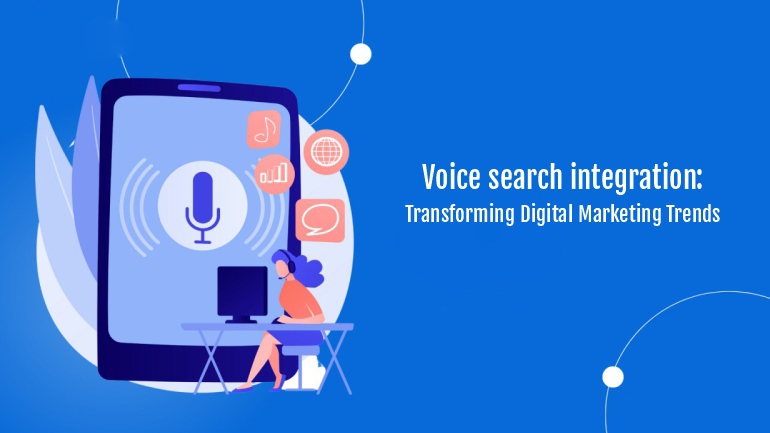Forecast: The Integration of Voice Search in Digital Marketing
In today's digital era, technology is advancing at an unprecedented rate, bringing enormous changes to various industries. One particular innovation that has revolutionized the way we search for information online is voice search. With the rise of virtual assistants like Siri, Alexa, and Google Assistant, more and more people are opting to search the web using their voice rather than typing. This shift in user behavior has significant implications for digital marketers, who must adapt their strategies to tap into the potential of voice search. This article will delve into the forecast for the integration of voice search in digital marketing and its impact on the industry.
The Growth of Voice Search
Voice search has seen remarkable growth in recent years, thanks to the increasing sophistication of virtual assistants and the widespread availability of voice-enabled devices. The convenience and speed of voice search have made it tremendously popular among users, allowing them to perform searches hands-free while multitasking. In fact, research suggests that by 2022, voice searches will make up more than half of all searches conducted on the internet.
Adapting SEO Strategies
With voice search gaining prominence, traditional methods of search engine optimization (SEO) need to be reevaluated. Voice searches tend to be more conversational in nature, with users employing natural language queries. To optimize for voice search, digital marketers should focus on long-tail keywords that mirror the way people speak. By incorporating these keywords in their content, businesses can increase their chances of appearing in voice search results.
Enhancing User Experience
Voice search is not only changing how people search for information but also how they consume it. Voice-enabled devices often provide direct answers to queries, offering a condensed version of the information users are looking for. This poses an opportunity for businesses to provide concise, valuable content that can secure featured snippets on search engine results pages. By tailoring content to answer specific questions, marketers can position themselves as reliable sources of information and build trust with their audience. here you go for best digital marketing service in us.
The Rise of Voice-Activated Devices
The integration of voice search in digital marketing goes beyond just optimizing content for voice queries. Smart speakers and other voice-activated devices have become household staples, creating new opportunities for marketers to engage with consumers. Brands can develop voice apps or skills that provide personalized experiences, answer frequently asked questions, or facilitate seamless shopping experiences. As these devices become more ingrained in our daily lives, businesses that embrace this technology will gain a competitive edge.
Local Search Optimization
Voice search has a significant impact on local search optimization. When people use voice search to find nearby businesses or services, they often include location-specific keywords. Digital marketers must ensure that their local listings and online directories are up to date to maximize their chances of appearing in voice search results. Additionally, businesses can leverage voice search to drive foot traffic by offering location-based promotions or exclusive deals for voice search users.
Data Analytics and Insights
As voice search grows in popularity, data analytics will play a crucial role in understanding user behavior and preferences. Digital marketers will need to analyze and interpret voice search data to gain insights into the needs and desires of their target audience. By understanding the context and intent of voice searches, businesses can tailor their marketing messages and strategies to effectively reach their customers.
Conclusion
The integration of voice search in digital marketing is an inevitable and transformative trend. As more users embrace voice-enabled devices and virtual assistants, businesses must adapt their strategies to complement this shift in user behavior. By optimizing content for voice search, enhancing user experience, and leveraging voice-activated devices, digital marketers can stay ahead of the curve and capitalize on the immense potential of voice search. Embracing this technology and mastering its nuances will be instrumental in driving success in the ever-evolving digital landscape.
FAQs
Q1.How does voice search impact traditional SEO strategies?
A: Voice search tends to be more conversational, requiring a shift towards long-tail keywords and natural language optimization to align with user queries.
Q2.What opportunities do voice-activated devices offer for digital marketers?
A: Voice-activated devices, including smart speakers, present opportunities for brands to develop personalized voice apps, answer FAQs, and enhance customer engagement.
Q3.How can businesses optimize for local search in the context of voice search?
A: To maximize visibility in voice search results, businesses should ensure their local listings and directories are up-to-date, incorporating location-specific keywords.
Q4.What role does data analytics play in understanding voice search user behavior?
A: Data analytics is crucial for interpreting voice search data, providing insights into user preferences and helping businesses tailor marketing strategies accordingly.
Q5.Why is the integration of voice search considered a transformative trend in digital marketing?
A: The rise of voice-enabled devices and virtual assistants necessitates strategic adaptation by businesses to optimize content, enhance user experiences, and leverage the potential of voice search for competitive advantage.
Categories
- Software Development
- Web Development
- iOS Development
- UI/UX Design
- Web Design
- Digital Marketing
- Graphic Design
- Android Development





